

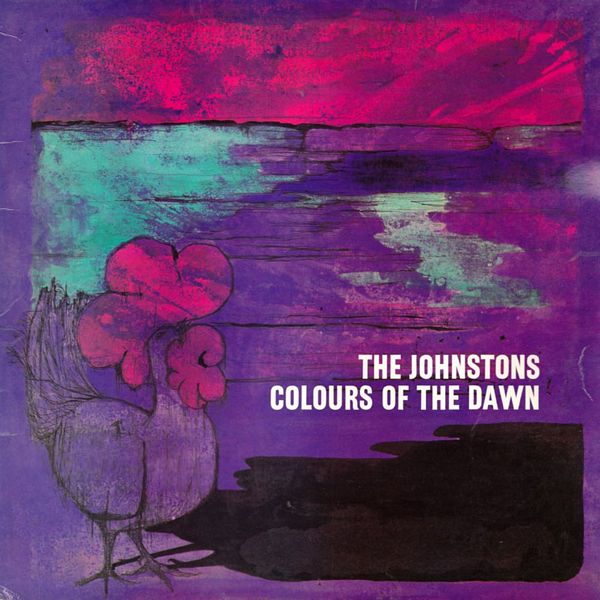 |
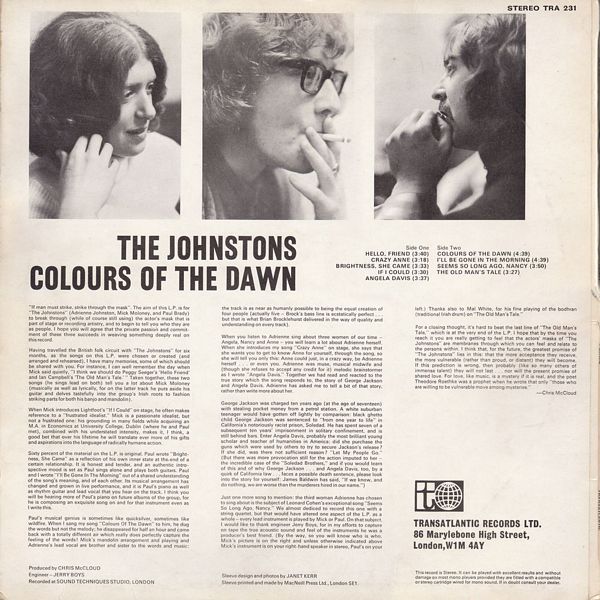
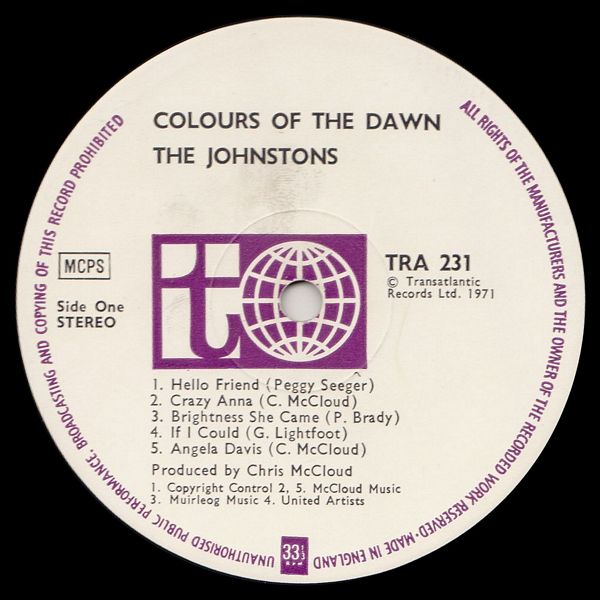
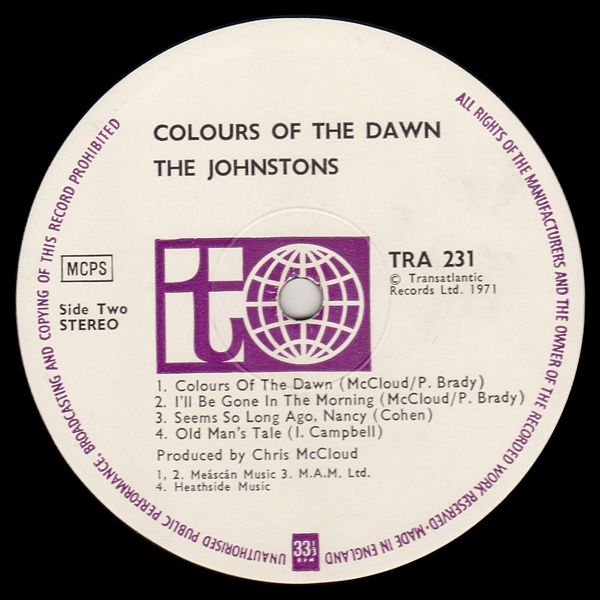 |
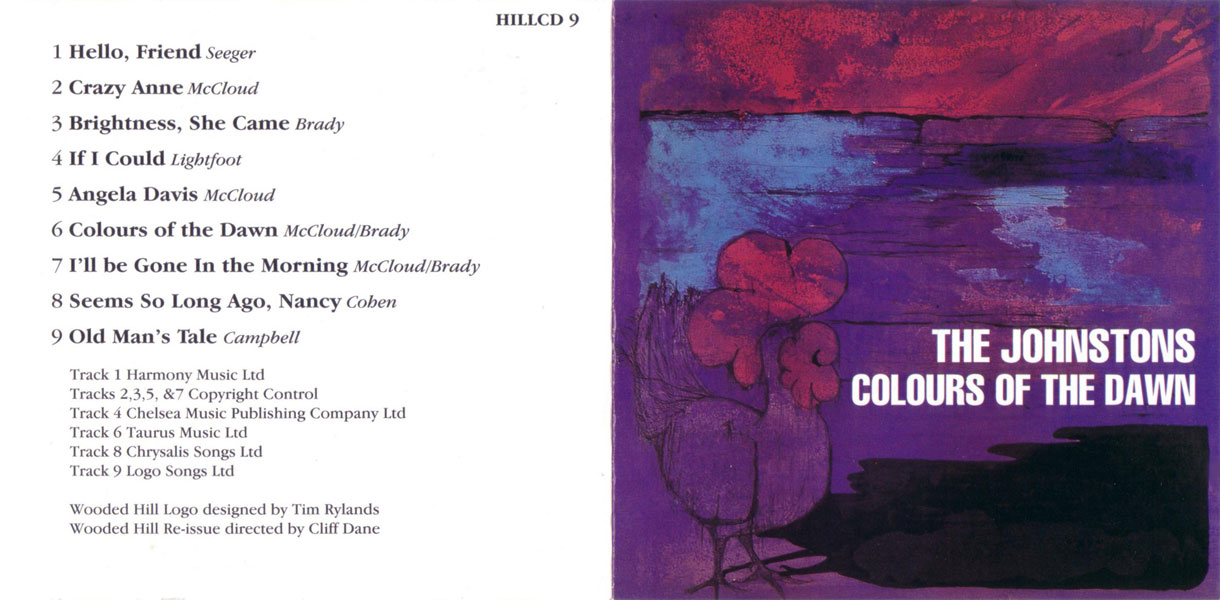 |
Sleeve Notes
"If man must strike, strike through the mask". The aim of this L.P. is for "The Johnstons" (Adrienne Johnston, Mick Moloney, and Paul Brady) to break through (while of course still using) the actor's mask that is part of stage or recording artistry, and to begin to tell you who they are as people. I hope you will agree that the private passion and commitment of these three succeeds in weaving something deeply real on this record.
Having travelled the British folk circuit with "The Johnstons" for six months, as the songs on this L.P. were chosen or created (and arranged and rehearsed), I have many memories, some of which should be shared with you. For instance, I can well remember the day when Mick said quietly, "I think we should do Peggy Seeger's 'Hello Friend' and Ian Campbell's 'The Old Man's Tale.' " Taken together, these two songs (he sings lead on both) tell you a lot about Mick Moloney (musically as well as lyrically, for on the latter track he puts aside his guitar and delves tastefully into the group's Irish roots to fashion striking parts for both his banjo and mandolin).
When Mick introduces Lightfoot's "If I Could" on stage, he often makes reference to a "frustrated idealist." Mick is a passionate idealist, but not a frustrated one: his grounding in many fields while acquiring an M.A. in Economics at University College, Dublin (where he and Paul met), combined with his understated intensity, makes it, I think, a good bet that over his lifetime he will translate ever more of his gifts and aspirations into the language of radically humane action.
Sixty percent of the material on the L.P. is original. Paul wrote "Brightness, She Came" as a reflection of his own inner state at the end of a certain relationship. It is honest and tender, and an authentic introspective mood is set as Paul sings alone and plays both guitars. Paul and I wrote "I'll Be Gone In The Morning" Out of a shared understanding of the song's meaning, and of each other. Its musical arrangement has changed and grown in live performance, and it is Paul's piano as well as rhythm guitar and lead vocal that you hear on the track. I think you will be hearing more of Paul's piano on future albums of the group, for he is composing an exquisite song on and for that instrument even as I write this.
Paul's musical genius is sometimes like quicksilver, sometimes like wildfire. When I sang my song "Colours Of The Dawn" to him, he dug the words but not the melody; he disappeared for half an hour and came back with a totally different air which really does perfectly capture the feeling of the words! Mick's mandolin arrangement and playing and Adrienne's lead vocal are brother and sister to the words and music: the track is as near as humanly possible to being the equal creation of four people (actually five — Brock's bass line is ecstatically perfect but that is what Brian Brocklehurst delivered in the way of quality and understanding on every track).
When you listen to Adrienne sing about three women of our time — Angela, Nancy and Anne — you will learn a lot about Adrienne herself. When she introduces my song "Crazy Anne" on stage, she says that she wants you to get to know Anne for yourself, through the song, so she will tell you only this: Anne could just, in a crazy way, be Adrienne herself … or even you. Adrienne was muse, musical midwife and (though she refuses to accept any credit for it) melodic brainstormer as I wrote "Angela Davis." Together we had read and reacted to the true story which the song responds to, the story of George Jackson and Angela Davis. Adrienne has asked me to tell a bit of that story, rather than write more about her.
George Jackson was charged ten years ago (at the age of seventeen) with stealing pocket money from a petrol station. A white suburban teenager would have gotten off lightly by comparison: black ghetto child George Jackson was sentenced to "from one year to life" in California's notoriously racist prison, Soledad. He has spent seven of a subsequent ten years' imprisonment in solitary confinement, and is still behind bars. Enter Angela Davis, probably the most brilliant young scholar and teacher of humanities in America: did she purchase the guns which were used by others to try to secure Jackson's release? If she did, was there not sufficient reason? "Let My People Go." (But there was more provocation still for the action imputed to her — the incredible case of the "Soledad Brothers," and if you would learn of this and of why George Jackson … and Angela Davis, too, by a quirk of California law … faces a possible death sentence, please look into the story for yourself: James Baldwin has said, "If we know, and do nothing, we are worse than the murderers hired in our name.")
Just one more song to mention: the third woman Adrienne has chosen to sing about is the subject of Leonard Cohen's exceptional song "Seems So Long Ago, Nancy." We almost decided to record this one with a string quartet, but that would have altered one aspect of the L.P. as a whole — every lead instrument is played by Mick or Paul. On that subject, I would like to thank engineer Jerry Boys, for in my efforts to capture on tape the true acoustic sound and feel of the instruments he was a producer's best friend. (By the way, so you will know who is who, Mick's picture is on the right and unless otherwise indicated above Mick's instrument is on your right-hand speaker in stereo, Paul's on your left.) Thanks also to Mal White, for his fine playing of the bodhrán (traditional Irish drum) on "The Old Man's Tale."
For a closing thought, it's hard to beat the last line of "The Old Man's Tale," which is at the very end of the L.P. I hope that by the time you reach it you are really getting to feel that the actors' masks of "The Johnstons" are membranes through which you can feel and relate to the persons within. I think that, for the future, the greatest promise of "The Johnstons" lies in this: that the more acceptance they receive, the more vulnerable (rather than proud, or distant) they will become. If this prediction is wrong, then probably (like so many others of immense talent) they will not last … nor will the present promise of shared love. For love, like music, is a mystery if it is real, and the poet Theodore Roethke was a prophet when he wrote that only "those who are willing to be vulnerable move among mysteries."
— Chris McCloud